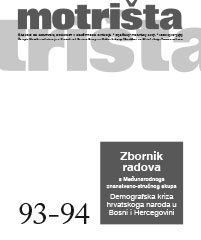Povrat otete imovine – bitan čimbenik povratka i opstanka
Return of seized property - an important factor of return and survival
Author(s): Stiepo Andrijić, Mira Pešić-AndrijićSubject(s): Economic history, Studies in violence and power, Nationalism Studies, Post-War period (1950 - 1989), Migration Studies, Socio-Economic Research
Published by: Matica hrvatska Mostar
Keywords: Property; taken property; the return of taken property; return; survival; illegitimate legislation; the protection of national interest;
Summary/Abstract: Property is a fundamental human right; fundamental prerequisite of the birth and existence of man in time and given space. Regulated property is an important and fundamental factor of human society. All the contents of the society rest on it. The stability and duration of state creation depends on the way of acquisition and regulation of the property. The legitimate ways of acquiring the property are: (1) the creation, (2) purchase, and (3) inheritance. Only these ways allow the stable political system and progress of the economy. Hence, the prerequisite of prosperity and stability of the present Bosnia and Herezegovina is the return of illegitimately acquired property, restitution. The return of illegitimately, with two fingers, taken property shoud be done. There are political forces that support a certificate of ownership that is achieved by force of illegitimate legal provisions. For example, the Party of Democratic Action at the House of Nations in 1998, stopped the passing of the law on restitution in the Federation of Bosnia and Herzegovina. If ultimately, the restitution law in the Federation of BaH falls behind one sovereign nation the Croatians are going to experience the final exodus in the Federation of Bosnia and Herzegovina.None of injustice and discrimination cannot be compared, width and depth, to this. The final ethnic cleansing of the Croatians will be carried out, especially in the capital city of the Federation and BaH. For example, before the World War II there were 27, 85% of Croatians in Sarajevo and they all lived in their own houses and apartments, mostly in flat areas from hotel Europe and the Cathedral (Latinluk) to Marijin dvor. All property in the current Titova Street is predominantly primary the property of Croatians. The assessment value that is made of the taken (nationalized) property of religious communities, religious associations, national cultural organizations and citizens talk about billions of euros relatively, in relation to the share of the total population, the Croatians have the biggest share. Without the restitution the roots will be cut on which return, reconstruction and future could be based.
Journal: Motrišta
- Issue Year: 2017
- Issue No: 93-94
- Page Range: 249-255
- Page Count: 7
- Language: Croatian

